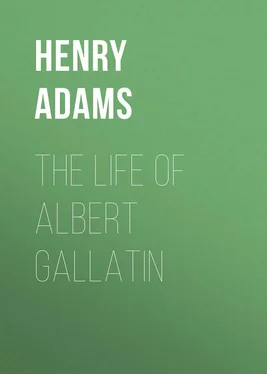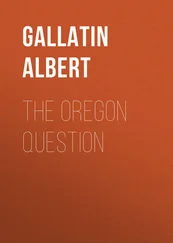Henry Adams - The Life of Albert Gallatin
Здесь есть возможность читать онлайн «Henry Adams - The Life of Albert Gallatin» — ознакомительный отрывок электронной книги совершенно бесплатно, а после прочтения отрывка купить полную версию. В некоторых случаях можно слушать аудио, скачать через торрент в формате fb2 и присутствует краткое содержание. Жанр: foreign_antique, foreign_prose, на английском языке. Описание произведения, (предисловие) а так же отзывы посетителей доступны на портале библиотеки ЛибКат.
- Название:The Life of Albert Gallatin
- Автор:
- Жанр:
- Год:неизвестен
- ISBN:нет данных
- Рейтинг книги:4 / 5. Голосов: 1
-
Избранное:Добавить в избранное
- Отзывы:
-
Ваша оценка:
- 80
- 1
- 2
- 3
- 4
- 5
The Life of Albert Gallatin: краткое содержание, описание и аннотация
Предлагаем к чтению аннотацию, описание, краткое содержание или предисловие (зависит от того, что написал сам автор книги «The Life of Albert Gallatin»). Если вы не нашли необходимую информацию о книге — напишите в комментариях, мы постараемся отыскать её.
The Life of Albert Gallatin — читать онлайн ознакомительный отрывок
Ниже представлен текст книги, разбитый по страницам. Система сохранения места последней прочитанной страницы, позволяет с удобством читать онлайн бесплатно книгу «The Life of Albert Gallatin», без необходимости каждый раз заново искать на чём Вы остановились. Поставьте закладку, и сможете в любой момент перейти на страницу, на которой закончили чтение.
Интервал:
Закладка:
“2d. Resolved, that it is necessary to obtain a speedy revision of said Constitution by a general convention.
“3d. Resolved that, therefore, in order to effect this desirable end, a petition be presented to the Legislature of the State requesting that honorable body to take the earliest opportunity to make application for that purpose to the new Congress.”
Thus it appears that if Mr. Gallatin went to this conference with the object indicated in his first draft, he abandoned the scheme of a national organization for a reform of the Constitution, and greatly modified his attitude towards the Constitution itself before the conference adjourned. The petition, with which the report closed, recommended twelve amendments, drawn from among those previously recommended by Massachusetts, Virginia, New York, and other States, and containing little more than repetitions of language already familiar. How far Mr. Gallatin led or resisted this acquiescent policy is unknown; at all events, it was the policy henceforth adopted by the opposition, which readily accepted Mr. Madison’s very mild amendments and rapidly transformed itself into a party organization with hands stretched out to seize for itself these dangerous governmental powers. But Mr. Gallatin never changed his opinion that the President was too powerful; even in his most mature age he would probably have preferred a system more nearly resembling some of the present colonial governments of Great Britain.
In the course of the next year the Legislature of Pennsylvania summoned a convention to revise the State constitution. There was perhaps some ground for doubting the legality of this step, for the existing constitution of 1776 gave to the Council of Censors the power to devise and propose amendments and to call a convention, and the Assembly had properly nothing to do with the subject. Mr. Gallatin held strong opinions upon the impropriety of obtaining the desired amendments by a process which was itself unconstitutional, and he even attempted to organize an opposition in the western counties, and to persuade the voters of each election district to adopt resolutions denouncing the proceeding as unconstitutional, unnecessary, and highly improper, and refusing to elect delegates. Early in October, 1789, he wrote to this effect to the leading politicians of Washington and Alleghany Counties, and, among the rest, to Alexander Addison, who was a candidate for the convention, and whom he urged to withdraw. A part of this letter, dated October 7, ran as follows:
“Alterations in government are always dangerous, and no legislator ever did think of putting, in such an easy manner, the power in a mere majority to introduce them whenever they pleased. Such a doctrine once admitted would enable not only the Legislature but a majority of the more popular house, were two established, to make another appeal to the people on the first occasion, and instead of establishing on solid foundations a new government, would open the door to perpetual changes and destroy that stability so essential to the welfare of a nation; as no constitution acquires the permanent affection of the people but in proportion to its duration and age. Finally, those changes would, sooner or later, conclude in an appeal to arms, – the true meaning of those words so popular and so dangerous, An appeal to the People .”
Mr. Gallatin’s opposition came too late. His correspondents wrote back to the effect that combined action was impossible, and a few days later he was himself chosen a delegate from Fayette County to this same convention which he had felt himself bound in conscience to oppose. This was in accordance with all his future political practice, for Mr. Gallatin very rarely persisted in following his own judgment after it had been overruled, but in this instance his course was perhaps decisively affected by the sudden death of his wife, which occurred at this moment and made any escape from his habitual mode of life seem a relief and an object of desire.
The convention sat from November 24, 1789, till February 26, 1790, and was Gallatin’s apprenticeship in the public service. Among his papers are a number of memoranda, some of them indicating much elaboration, of speeches made or intended to be made in this body; one is an argument in favor of enlarging the number of Representatives in the House; another, against James Ross’s plan of choosing Senators by electors; another, on the liberty of the press, with “quotations from Roman code, supplied by Duponceau.” There is further a memorandum of his motion in regard to the right of suffrage, by virtue of which every “freeman who has attained the age of twenty-one years and been a resident and inhabitant during one year next before the days of election;” every naturalized freeholder, every naturalized citizen who had been assessed for State or county taxes for two years before election day, or who had resided ten years successively in the State, should be entitled to the suffrage, paupers and vagabonds only being excluded. Gallatin seems also to have been interested, both at this time and subsequently, in an attempt to lessen the difficulties growing from the separation of law and equity. On this subject he wrote early to John Marshall for advice, and although the reply has no very wide popular interest, yet, in the absence of any collection of Marshall’s writings, this letter may claim a place here, illustrating, as it does, not only the views of the future chief justice, but the interests and situation of Mr. Gallatin:
Dear Sir, – I have received yours of the 23d of December, and wish it was in my power to answer satisfactorily your questions concerning our judiciary system, but I was myself in the army during that period concerning the transactions of which you inquire, and have not since informed myself of the reasons which governed in making those changes which took place before the establishment of that system which I found on my coming to the bar. Under the colonial establishment the judges of common law were also judges of chancery; at the Revolution these powers were placed in different persons. I have not understood that there was any considerable opposition to this division of jurisdiction. Some of the reasons leading to it, I presume, were that the same person could not appropriate a sufficiency of time to each court to perform the public business with requisite despatch; that the principles of adjudication being different in the two courts, it was scarcely to be expected that eminence in each could be attained by the same man; that there was an apparent absurdity in seeing the same men revise in the characters of chancellors the judgments they had themselves rendered as common-law judges. There are, however, many who think that the chancery and common-law jurisdiction ought to be united in the same persons. They are actually united in our inferior courts; and I have never heard it suggested that this union is otherwise inconvenient than as it produces delay to the chancery docket. I never heard it proposed to give the judges of the general court chancery jurisdiction. When the district system was introduced in ‘82, it was designed to give the district judges the powers of chancellors, but the act did not then pass, though the part concerning the court of chancery formed no objection to the bill. When again introduced it assumed a different form, nor has the idea ever been revived.
The first act constituting a high court of chancery annexed a jury for the trial of all important facts in the cause. To this, I presume, we were led by that strong partiality which the citizens of America have for that mode of trial. It was soon parted with, and the facts submitted to the judge, with a power to direct an issue wherever the fact was doubtful. In most chancery cases the law and fact are so blended together that if a jury was impanelled of course the whole must be submitted to them, or every case must assume the form of a special verdict, which would produce inconvenience and delay.
Читать дальшеИнтервал:
Закладка:
Похожие книги на «The Life of Albert Gallatin»
Представляем Вашему вниманию похожие книги на «The Life of Albert Gallatin» списком для выбора. Мы отобрали схожую по названию и смыслу литературу в надежде предоставить читателям больше вариантов отыскать новые, интересные, ещё непрочитанные произведения.
Обсуждение, отзывы о книге «The Life of Albert Gallatin» и просто собственные мнения читателей. Оставьте ваши комментарии, напишите, что Вы думаете о произведении, его смысле или главных героях. Укажите что конкретно понравилось, а что нет, и почему Вы так считаете.












